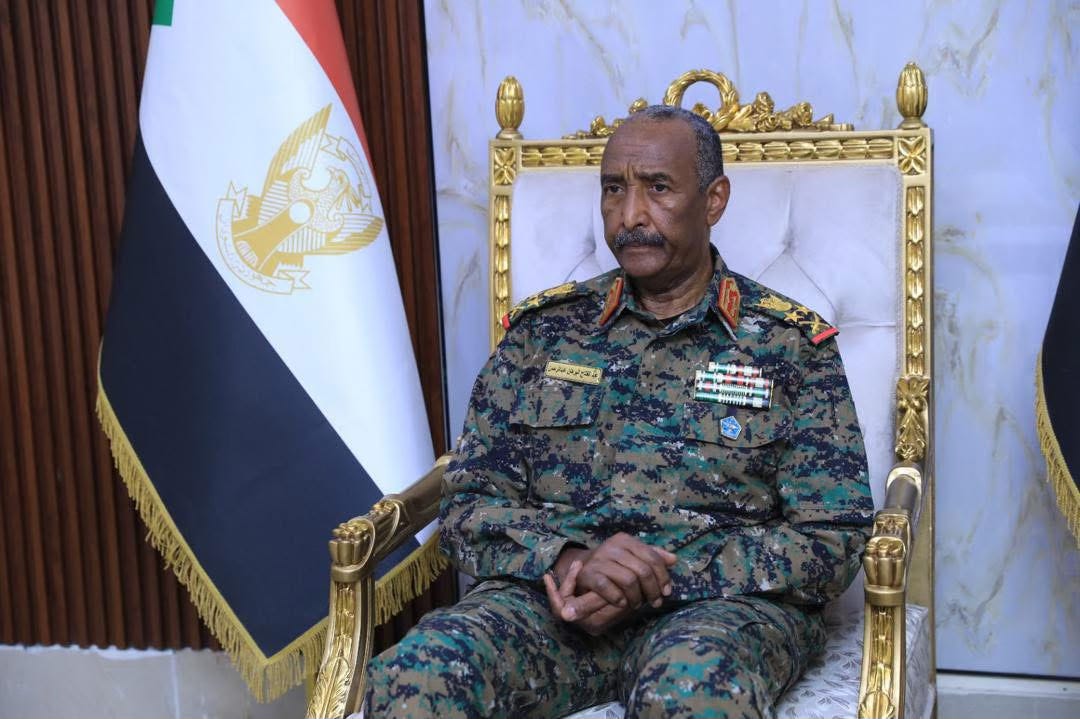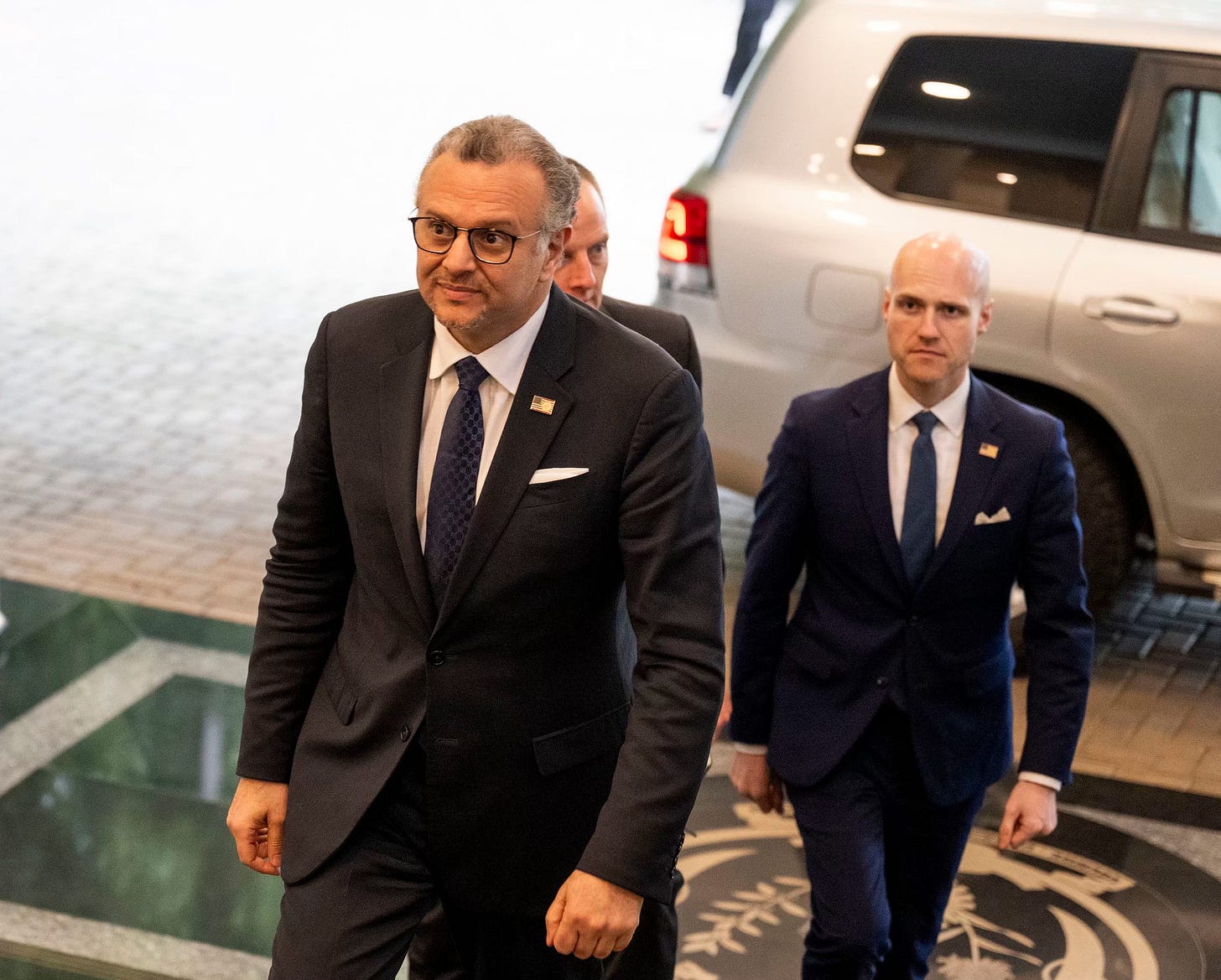Sudan’s Military Ruler Attacks Trump’s Envoy in Fiery Speech
Al-Burhan accuses U.S. envoy of bias, refuses peace plan
Sudan’s military ruler, General Abdelfattah al-Burhan, delivered a scathing address Sunday accusing the United States’ diplomatic envoy, Massad Boulos, of lacking neutrality and parroting Emirati propaganda.
The army chief, who heads the military junta that controls Sudan’s government (the Transitional Sovereign Council), claimed that Boulos’ role had shifted from mediator to “a channel for RSF narratives,” adding that the envoy “speaks as if dictating terms on behalf of the militia’s foreign backers,” referring to the United Arab Emirates.
Al-Burhan’s speech fits within a larger pattern of rhetoric against international peace efforts, as Sudan’s military junta attempts to justify its continuing refusal to negotiate an end to the conflict or even to accept a short-term humanitarian ceasefire to alleviate famine and disease.
The war in Sudan puts the national military (the Sudanese Armed Forces, or SAF) against a regional paramilitary (the Rapid Support Forces, or RSF) that mutinied in 2023, triggering the three-year conflict. The two warring parties formerly ruled Sudan together from late 2021 to early 2023, following a military coup that toppled the civilian government.
Speaking to an audience of military officers in Port Sudan, Al-Burhan accused the U.S. of driving a diplomatic track designed to fragment Sudan’s military and formally entrench RSF control over western parts of the country.
The RSF have now consolidated control over the whole of Darfur, capping their months-long advance with the fall of El Fasher — the last major urban center in the region that had remained under SAF control. Large parts of the vast Kordofan region are also under RSF control, or contested. Any immediate ceasefire would freeze frontlines in a manner that effectively ratifies the RSF’s territorial dominance across Darfur and parts of Kordofan.
After a ceasefire, the role of the RSF and the SAF in the future governance of Sudan — if any — could be determined through further diplomatic talks and political processes. But the Sudanese military does not want to give a chance for such negotiations, preferring to resolve the matter on the battlefield instead. Al-Burhan’s remarks serve as the SAF’s strongest declaration yet that it will not engage politically to end the war. Instead, the SAF has demanded essentially that the RSF surrender unconditionally.
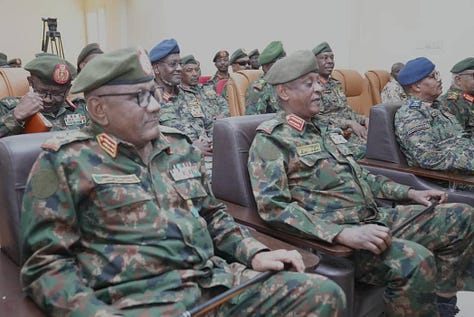
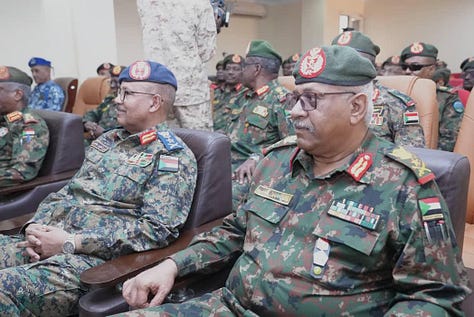
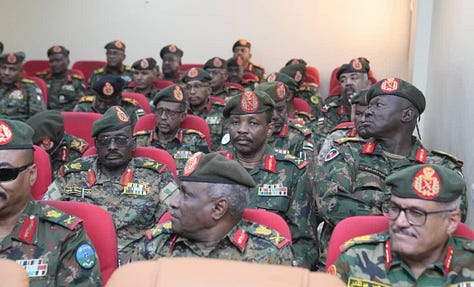
In his speech Sunday, Al-Burhan asserted that Washington’s envoy, Massad Boulos — a senior adviser to President Trump on Arab and African affairs — presented a plan that abolishes the army, legitimizes the RSF, and imposes unacceptable conditions. Al-Burhan warned that any negotiation that begins with the recognition of the militia is a non-starter.
“In the past period many initiatives and documents were presented, but we remained committed to one goal; any initiative that recognizes the rebels, we do not accept. People might say we are rejecting peace, but we say: anyone who wants peace and wants to bring peace must listen to us Sudanese who have suffered from this war. They must listen to the Sudanese people who have tasted its bitterness.”
“We all know the Janjaweed [RSF] are present as an armed militia, and there will be no peace as long as they exist. We do not want to pamper them or store them away for later so they can cause new problems tomorrow. “
“We received many initiatives, and the decisive point was always the same: they occupy our areas, they mobilize and fight — therefore there can be no peace with them. Many of our friends and allies understood this, and they were convinced that the presence of this militia makes peace impossible.”
The attack on U.S. mediation came only days after U.S. President Donald Trump met Saudi Crown Prince Mohammed bin Salman in Washington, where the Saudi leader provided a briefing on Riyadh’s latest diplomatic efforts for Sudan. Controversially, the joint Saudi-U.S. mediation has expanded under Trump to include Egypt and the United Arab Emirates (UAE), which have actively supported opposite sides in the conflict, fueling the war.
Diplomats from these four countries, dubbed ‘the Quad’, conducted meetings in Washington in September and October, including with delegations from both warring parties. Though these talks were indirect, they represent the most concerted international peace effort since the former U.S. envoy, Tom Perriello, staged a peace conference in Switzerland in August 2024.
During these negotiations, the Quad countries issued a public appeal for a three-month humanitarian truce. SAF rejected the proposal, while the RSF accepted it. The host of these talks, U.S. Presidential Advisor Massad Boulos, is an Arabic speaker and a Lebanese-American businessman. He is also the father-in-law of Donald Trump’s daughter Tiffany.
Despite this family relationship, Trump said publicly last week that he had not paid any attention to Sudan until the Saudi crown prince, Mohammed bin Salman Al Saud, raised the issue with him:
Trump’s comments do not necessarily mean that the Sudan file will become a priority in Washington. Boulos, the envoy tasked with handling U.S.-Sudan talks, has a large portfolio covering all of Africa, and Trump may lose interest if the negotiations stall or even fail to get off the ground.
Despite this, some political analysts cautiously welcomed such high-level political engagement to end the conflict. “Trump’s remarks on Sudan (at Mohammed bin Salman’s behest) may well be a turning point in ending the war, given that it will take top-level focus from U.S. and Arab leaders to halt it,” said Alan Boswell, the Horn of Africa director at the International Crisis Group, a research body dedicated to preventing and solving global conflicts.
“A lot of people desperately want this to succeed,” said Kholood Khair, a Sudanese political analyst, as quoted by The New York Times last week. “But I’m concerned that Sudan will get lost amid the competition between U.A.E. and Saudi Arabia.” For Trump, she added, “it could end up being about how to keep the Arabs happy, and not very much about Sudan.”
The New York Times added:
“As Mr. Trump made clear, his sudden interest in Sudan is driven largely by his desire to please a wealthy Gulf ally. At the least, though, his remarks represented the boldest claim yet by an American president that he would get involved in Sudan since the war erupted.”
‘We Consider the Mediator Biased’
Delivered just days after Trump’s comments, Al-Burhan’s speech reflects a sweeping rejection of the latest diplomatic push. He stated:
“The Quad (Saudi Arabia, UAE, Egypt, US) presented three proposals. We rejected the first because it contradicted Sudan’s principles, the sacrifices of our people, and our ambitions as military professionals. So, we did not present it to the public. We amended it, prepared our own Roadmap, and said: anyone who wants to solve the Sudanese crisis, the roadmap is here.
“This Roadmap contains essential steps: a ceasefire — yes, we are ready to stop the war — but a ceasefire must be accompanied by measures that build trust. We have no objection to halting operations, but the ceasefire must be tied to the withdrawal of this militia from all areas it entered after the Jeddah talks [abortive talks conducted in early 2023 soon after the war began]: withdraw from Geneina, Zalingei, El Fasher, and all the cities they captured. They must move to designated assembly areas agreed with the mediator. Only then can life return, displaced people return, reconstruction begin, and Sudanese sit down to negotiate the future of their state.”
“But as long as this militia remains present, the displaced will not return.”
“We received a second proposal. We referred it to our Peace and Defense Council, they studied it, and we responded. It was close to our Roadmap: withdrawal, assembly areas, restoration of normal life, return of displaced people and refugees, reconstruction, and Sudanese–Sudanese dialogue.”
“But the third proposal — the worst — eliminated the existence of the Armed Forces altogether. It called for dissolving the security services while allowing the militia to remain in place. This proposal is unacceptable. And we consider the mediator biased — especially the U.S. envoy Mazad Bolous. He talks to us as if imposing conditions.”
“We fear he may become an obstacle to the peace we want and the peace the Sudanese people want.”
“Boulos accuses us of obstruction, accuses us of using chemical weapons, threatens us, and presents an unacceptable proposal. We say to him: if you want a solution, return to the roadmap. No Sudanese will accept the rebels being part of any future Sudanese state. Any country supporting them is also unacceptable. Any political group assisting them is unacceptable.”
“We are not rejecting peace. But no one threatens us or imposes conditions on us. We are not weak, and the Sudanese people are not weak. Our strength comes from our soldiers, officers, and our people — this is our source of power,” he said.
In the same speech, Al-Burhan dismissed claims that Sudan’s military is dominated by Islamist networks, calling the allegations a foreign-backed narrative designed to weaken the army. He insisted that any restructuring of the armed forces will be decided solely by Sudanese officers and will not be dictated by any external actor:
“As for the story being spread about ‘Islamists controlling the army’ — we say: where are these Islamists? Come, show them to us. This is just a narrative [RSF and the UAE] created to deceive the Americans, Egyptians, and Saudis. We say clearly: this is false. This army will be restructured by us — no one from outside will tell us how to do it. No one will dissolve our security services. No one will impose anything on us. Whoever wants to help Sudan achieve peace must walk with us on our path.”
To date, Sudan’s military and the RSF have refused peace negotiations since 2023, apart from informal and indirect talks. Each side regularly voices maximalist war aims that include utterly destroying the other side. In the meantime, the war has generated the world’s largest humatiarina crisis, displacing millions of people internally and as refugees to other countries.
Support our journalism
Thank you for reading Sudan War Monitor. We do this work because we believe that journalism is one accountability mechanism that ultimately can contribute toward peace and justice in Sudan—however distant that hope may be. Our work is intended to be a resource for humanitarians, civil society, ordinary Sudanese, diplomats, news media, and concerned foreign observers.
Subscribe or share to support our work and help “Keep Eyes on Sudan.”


